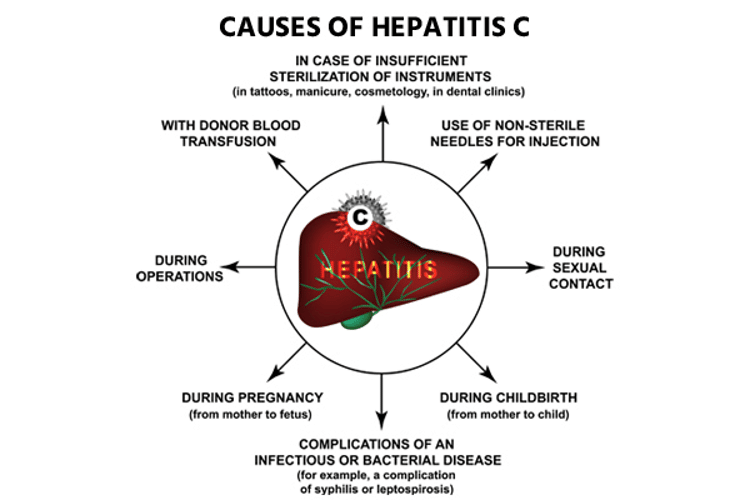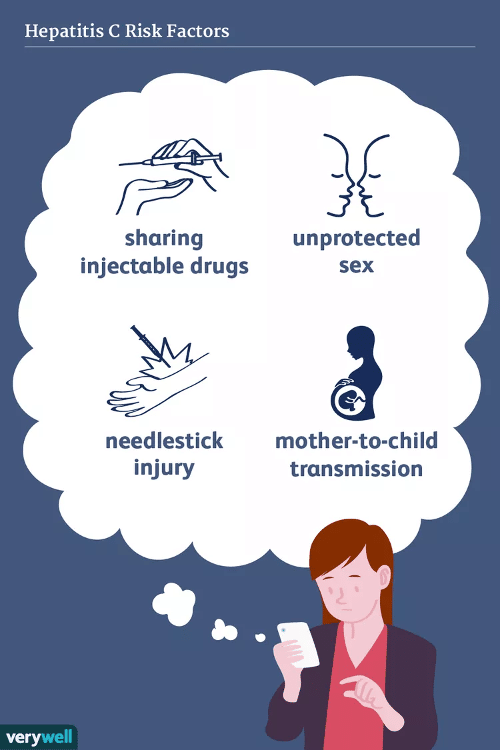What is hepatitis C?
- Hepatitis C (HCV) is a virus that can cause liver damage. It is spread through direct blood-to-blood contact. It is transmitted by the blood of someone who is infected and must directly enter your bloodstream.
- Hepatitis C is a very common disease. However, you CAN take steps to prevent getting hepatitis C. If you have hepatitis C, there are treatments that can cure it and keep your liver healthy.
How do you get hepatitis C?
- Using injection drugs is the most common way people get hepatitis C.
- Sharing injection equipment with someone who is infected with hepatitis C puts you at risk.
- Even a tiny amount of blood – so small you can’t see it – can carry the virus. That’s why hepatitis C can be passed on by sharing equipment that may have been in contact with someone’s blood while injecting.
Hepatitis C and Your Liver
- When someone contracts hepatitis C, the virus travels to the liver, and causes inflammation. Sometimes the immune system “clears” the virus within the first 6 months of being infected. However, most people develop long-term (aka chronic) hepatitis C.
What does the liver do?
- You need your liver to live.
- The liver filters everything we breathe, eat, drink, inhale, and inject into our bodies.
- For people with chronic hepatitis C, some may experience no liver-related complications while others may develop serious liver scarring called cirrhosis.
- The more the liver scars the less it can do its job which can lead to problems.
- People with severe cirrhosis may develop liver cancer or liver failure.
What does hepatitis mean?
- Hepatitis is a general term for “inflammation of the liver.”
How do you get it?
- Inflammation of the liver can be caused by heavy alcohol use, prescription medications, and is more commonly caused by viruses like hepatitis A, B, and C
How serious is it?
- More than 50% of people who get infected with the hepatitis C virus develop a chronic infection.
- 5%-25% of people with chronic hepatitis C develop cirrhosis over 10–20 years.
Who should get tested?
- Everyone should get tested (even if you have never injected drugs).
- CDC recommends hepatitis C testing for:
- All adults aged 18 years and older
- All pregnant women during each pregnancy
- People who ever injected drugs and shared needles, syringes, or other drug preparation equipment, including those who injected once or a few times many years ago. Regular testing is recommended for people who currently inject and share needles, syringes, or other drug preparation equipment.
- People with HIV
- People who have ever received maintenance hemodialysis. Regular testing is recommended for people who currently receive maintenance hemodialysis.
- People who received clotting factor concentrates produced before 1987
- People who received a transfusion of blood or blood components before July 1992
- People who received an organ transplant before July 1992
- People who were notified that they received blood from a donor who later tested positive for HCV infection
- Health care, emergency medical, and public safety personnel after needle sticks, sharps, or mucosal exposures to HCV‑positive blood
- Children born to mothers with HCV infection
- Any person who requests hepatitis C testing should receive it.
Testing and treatment of HCV at LTHC
- Testing: There is a 2-step test to determine if you have an HCV infection:
- HCV Antibody Test: Determines the presence of antibodies in the blood.
- Positive result: This means that you are either currently infected with the virus or have been infected previously.
- An additional blood test, the HCV RNA PCR test, will need to be drawn to see if there is a viral load.
- Positive viral load: This means that the virus is currently present in the blood and could give it to others.
- Negative viral load: This means you were infected with HCV but the virus is no longer in the body either due to being cured with treatment or having cleared the virus naturally.
- If the HCV antibody test is non-reactive/negative: This means that there is no current active hepatitis C infection.
- An additional blood test, the HCV RNA PCR test, will need to be drawn to see if there is a viral load.
- Treatment: Treatment for hepatitis C typically consists of an oral medication that is taken for 8 to 12 weeks. This medication has been highly effective at clearing the infection in more than 90% of people.
- Positive result: This means that you are either currently infected with the virus or have been infected previously.
- HCV Antibody Test: Determines the presence of antibodies in the blood.
How to prevent hepatitis C infection
- Avoid direct contact with other people’s blood, especially if you know they are Hep C positive
- Use sterile or single-use needles
- Use a new needle with every injection
- Use medical grade sharps containers
- Use big red sharps kiosks
- 6 on Lummi Reservation (see kiosk map)
- Call Lummi Harm Reduction Program for syringe pick-up/exchange at (360) 325-2779
Sources:
CDC
https://www.cdc.gov/hepatitis/abc/index.htm
NHS



